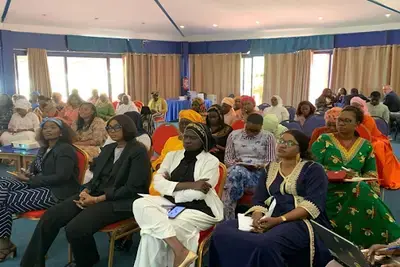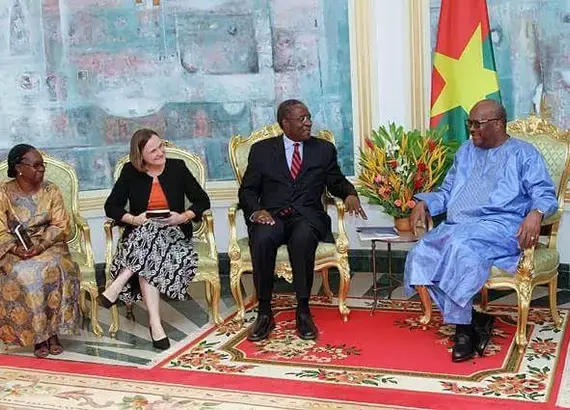
Success Story
NDI and Three Nations in the Sahel Collaborate on Security Threats
Western Africa’s Sahel region “has for several years known an unprecedented security crisis,” according to NDI Central and West Africa Director Dr. Christopher Fomunyoh. This crisis “places strain on all people of the Sahel and simultaneously constitutes a real threat to international security and governance.” To foster a regional approach to this crisis, NDI held a forum from November 20 to December 1 in Ouagadougou, Burkina Faso, which gathered members of parliament (MPs), civil society organization (CSO) representatives and executive agency staffers from Burkina Faso, Mali and Niger.
Over three days, participants discussed opportunities for cross-border and multisectoral collaboration aimed at strengthening democratic governance of the security sector and promoting human security. Burkinabe, Malian and Nigerien security sector reform experts joined panelists from the African Union, Economic Community of West African States (ECOWAS), G5 Sahel; a regional organization established in 2014 by the governments of Burkina Faso, Chad, Mali, Mauritania, and Niger that aims to foster security and development in the region; and the United Nations Office on Drugs and Crime (UNODC) to provide a practitioner’s perspective on tackling pressing security threats.
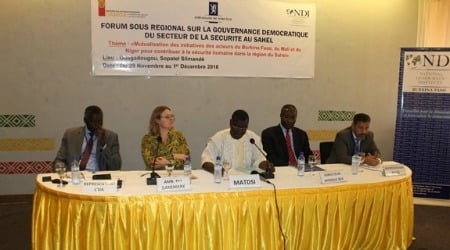
From left: Amadou Diongué (African Union Representative), Danish Ambassador Ulla Næsby Tawiah, Alfred Gouba (Burkina Faso Secretary of State for Decentralization; delivering his speech), Dr. Christopher Fomunyoh (NDI Director for Central and West Africa) and Mohamed Znagui Sid Ahmed Ely (G5 Sahel Representative)
Panelists outlined these threats, which include:
-
porous borders that facilitate cross-border criminality, from banditry to human and drug trafficking to terrorism;
-
an absence (real or perceived) of state administration, defense and security agents;
-
lack of social services in stretches of territory; and
-
a history of military rule in the region, which has weakened public confidence in the state’s ability to protect and provide for its citizens.
Working in small groups, the MPs, CSO representative and executive branch personnel brainstormed robust approaches to face these multifaceted security threats.
“More than ever, it’s time to come together as one to fight terrorism for, as we face this threat together, we are condemned to win or to perish together,” said Abass Malam, a civil society representative from Niger, appealing to the other country participants for mutually reinforcing, coordinated initiatives.
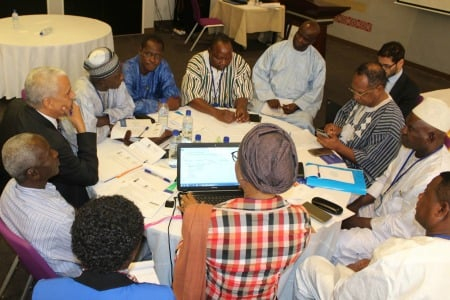
Members of Parliament from Burkina Faso, Mali and Niger during a Group Work Session
Participants also acknowledged and highlighted women’s roles in mitigating security risks. They encouraged greater integration of gender into security management in a region where women constitute approximately 52% of the population.
“Who more than a woman, a spouse and a mother can better advise her husband or her children not to go to war or engage in acts of terrorism?” queried MP Marie Laurence Ilboudo, member of the Defense and Security Commission of Burkina Faso’s National Assembly.
At the end of the forum, participants issued a joint declaration detailing recommended steps to take to increase human security in Burkina Faso, Mali and Niger.
Recommendations for MPs included establishing regular consultations, updating the legal framework so that security threats can be effectively managed while respecting human rights and harmonizing legislation across all three countries to facilitate cooperation between security services.
CSOs were tasked with playing a more prominent role in security sector governance, putting in place a platform for CSOs in the three countries, holding more awareness-raising activities on human security, and building relationships between national and local organizations.
Executive agencies were called on to increase the number of frontier posts manned by security agents, reinforce coordination between border management authorities, build working relationships with the legislative branch, put in place basic infrastructure in border regions, and take women into account in security sector governance.
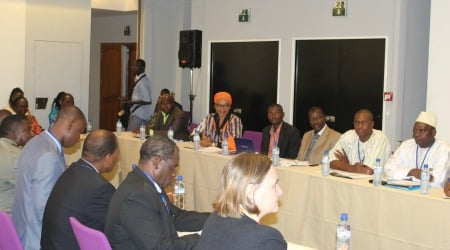
Participants in Plenary at the Regional Sahel Security Forum
Following the joint declaration, the three countries’ program partners engaged the press to relay the forum’s recommendations. As journalists raised concerns about implementation of these recommendations, partners reiterated their will and commitment to work in synergy on joint security governance initiatives within and beyond borders.
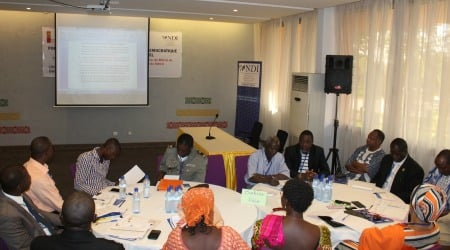
Burkinabe Participants from Civil Society, the Executive Branch and Parliament Formulate Proposals and Recommendations to Improve Security
Bringing together MPs, civil society representatives and executive agency staffers from Burkina Faso, Mali and Niger allowed participants to create and adopt mechanisms for collaboration by sector and by country, as well as across sectors and countries. They successfully developed a roadmap for continued regional cooperation: the will continue to hold similar dialogue sessions on a recurring basis, organize joint activities that bring defense and security forces together with civilians - especially in border zones - and establish a multi-actor framework to discuss security issues.
Adopting a multisectoral, cross-cutting and regional strategy, as forum participants successfully committed to do in Ouagadougou, presents the most robust method to combat the transnational threats facing those who call the Sahel region their home.
The forum was conducted as part of a program supported by the Ministry of Foreign Affairs of Denmark under the framework of the Danish Regional Stabilisation and Peace Programme, which is also funded by the Norwegian Ministry of Foreign Affairs. The Ambassador of Denmark to Burkina Faso, Ulla Næsby Tawiah, and the Secretary of State for Decentralization, Alfred Gouba, representing Burkina Faso’s Ministry of Territorial Administration, Decentralization and Interior Security, provided opening remarks.
Published on December 27, 2016
